Lay beliefs about (psych) science
Twitter/X: @cruz_fcorreia
New work by @olivergenschow.bsky.social
@protzko.bsky.social @sebraem.bsky.social 💡

New work by @olivergenschow.bsky.social
@protzko.bsky.social @sebraem.bsky.social 💡
Does studying psychology change how people think about psychology (even at an intuitive level)? 🤔
We tracked students across their degree and found shifts in their beliefs about the bases of psychological phenomena and their scientific explainability.
1/5
Does studying psychology change how people think about psychology (even at an intuitive level)? 🤔
We tracked students across their degree and found shifts in their beliefs about the bases of psychological phenomena and their scientific explainability.
1/5
Only when we see the bias as very desirable we might think we are = to others on it.
From @cruzf.bsky.social & André Mata
link.springer.com/content/pdf/...
#psych #phdsky

Only when we see the bias as very desirable we might think we are = to others on it.
From @cruzf.bsky.social & André Mata
link.springer.com/content/pdf/...
#psych #phdsky
In a new post for Character & Context (@spspnews.bsky.social), I dive into my work with @tanialombrozo.bsky.social on how jargon shapes scientific understanding. Check it out here!
spsp.org/news/charact...
In a new post for Character & Context (@spspnews.bsky.social), I dive into my work with @tanialombrozo.bsky.social on how jargon shapes scientific understanding. Check it out here!
spsp.org/news/charact...
Recentemente, estive à conversa com o @tiagoramalho.bsky.social a respeito da investigação que tenho conduzido.
💡 Falámos sobre temas que me entusiasmam: Sobreconfiança e aprendizagem de ciência, como isto é impactado pela inteligência artificial, etc.
Para os interessados👇

Recentemente, estive à conversa com o @tiagoramalho.bsky.social a respeito da investigação que tenho conduzido.
💡 Falámos sobre temas que me entusiasmam: Sobreconfiança e aprendizagem de ciência, como isto é impactado pela inteligência artificial, etc.
Para os interessados👇
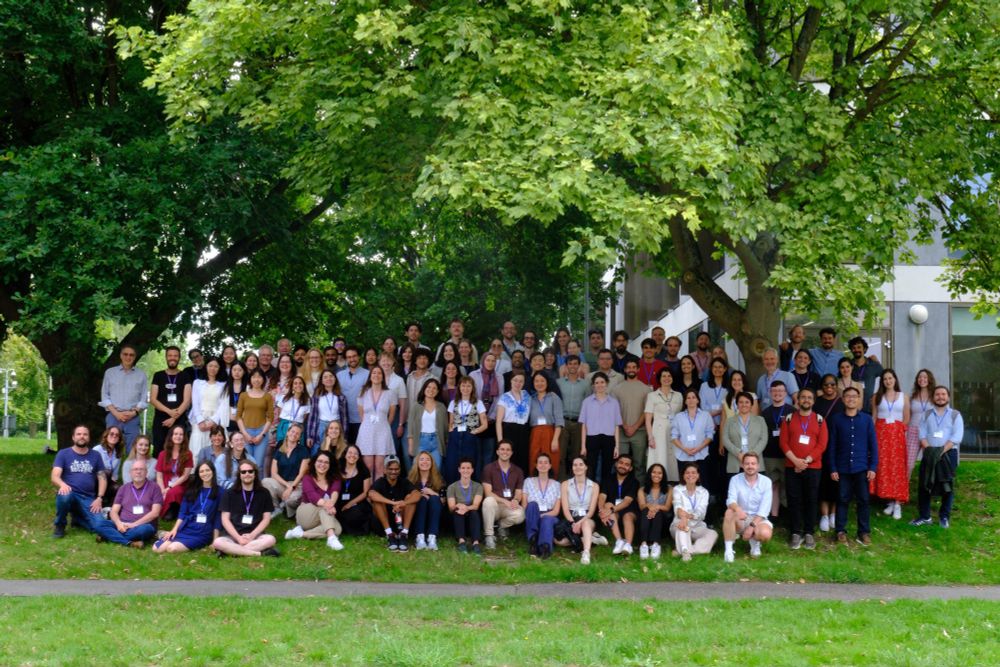
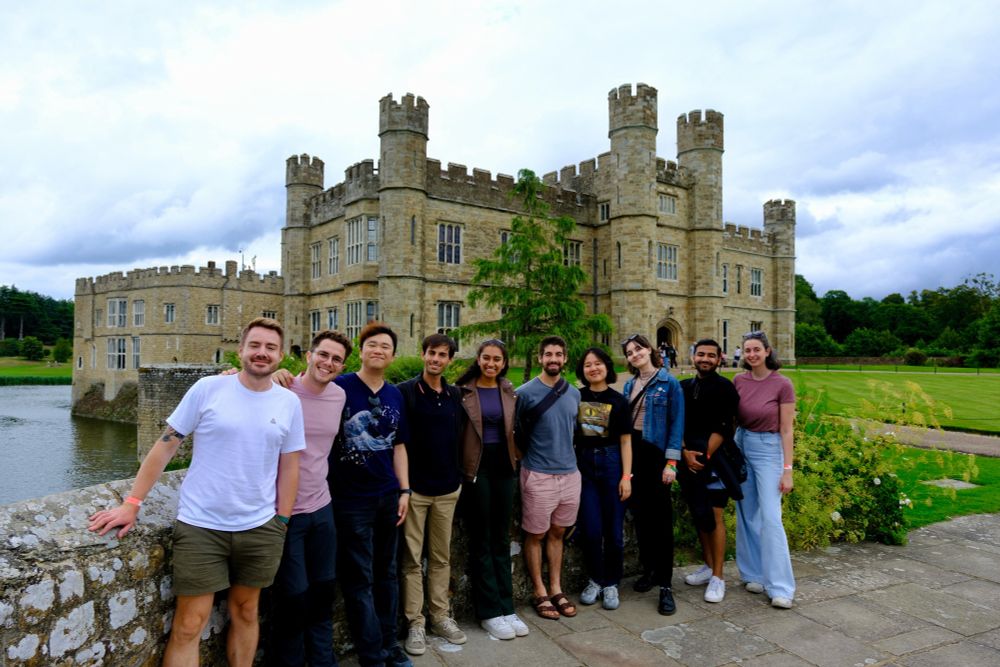
📹 We show that video debiasing training can boost reasoning accuracy - not just deliberation, but intuition too!
🔓 Open access: www.sciencedirect.com/science/arti...
Quick summary👇
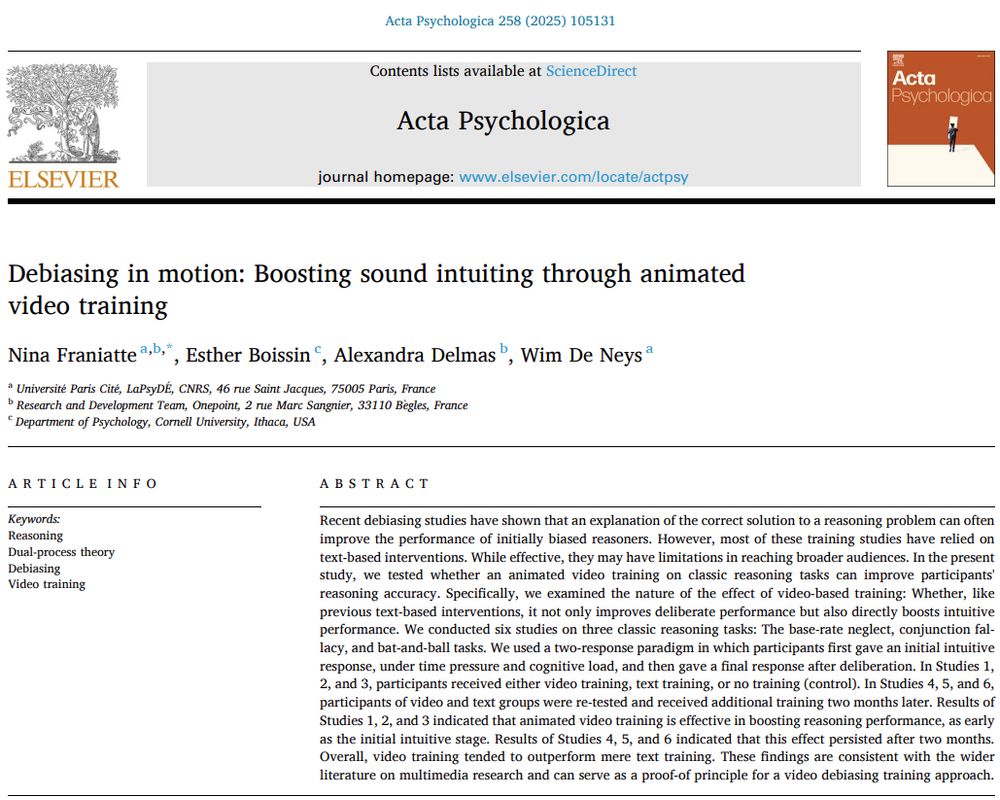
📹 We show that video debiasing training can boost reasoning accuracy - not just deliberation, but intuition too!
🔓 Open access: www.sciencedirect.com/science/arti...
Quick summary👇
buff.ly/FWgSBaZ
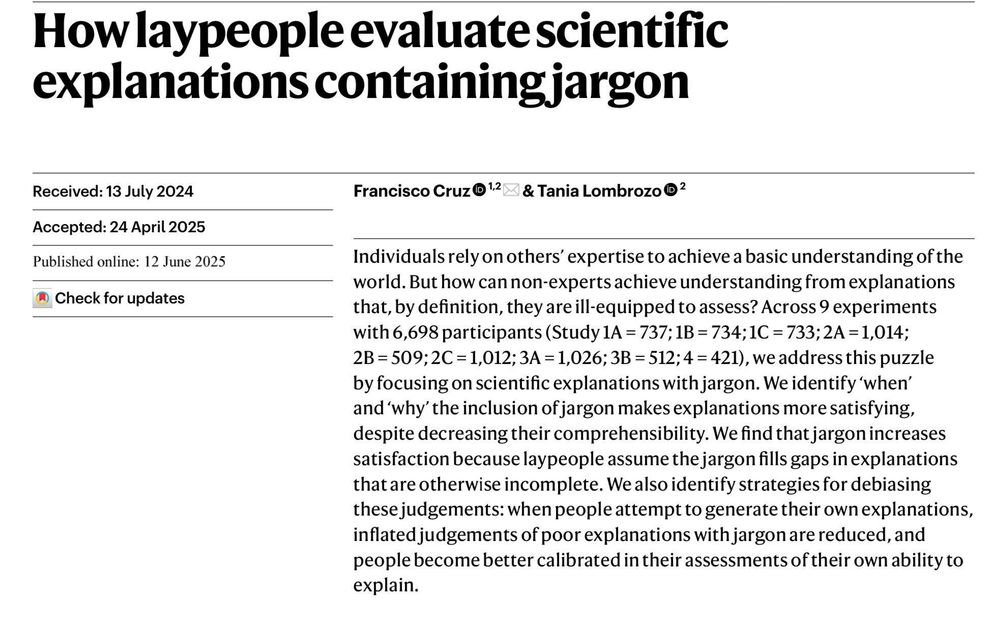
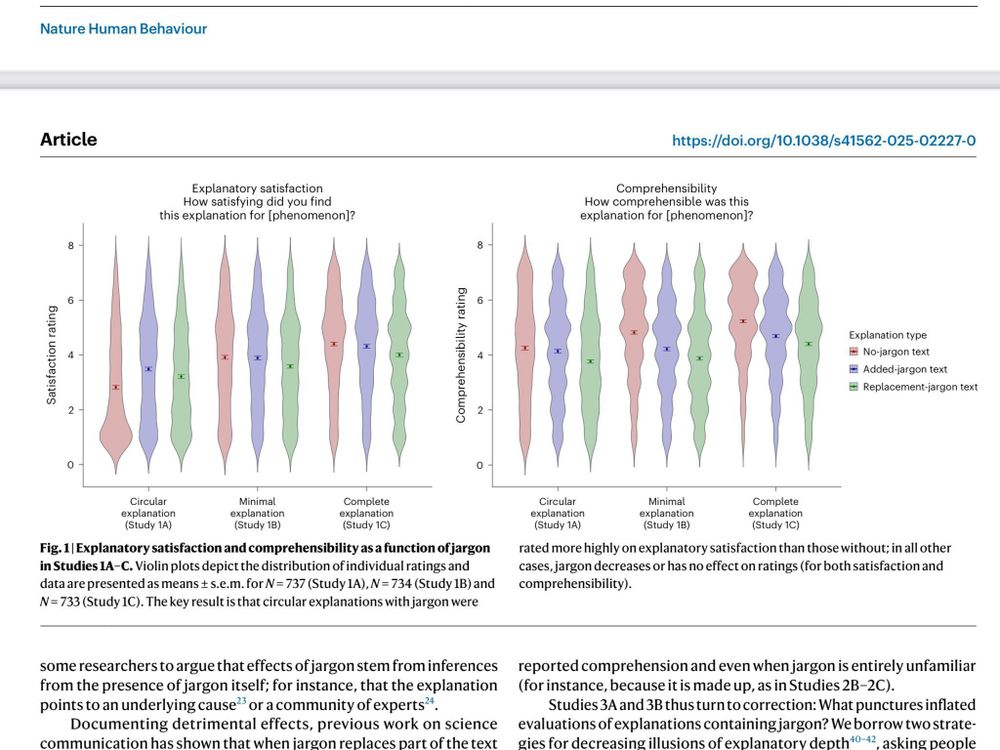
buff.ly/FWgSBaZ
Publishing in Nature has always been a goal of mine, and I’m so happy I got there with work developed at Princeton, where I learned so much and grew as a researcher.
1/9
Publishing in Nature has always been a goal of mine, and I’m so happy I got there with work developed at Princeton, where I learned so much and grew as a researcher.
1/9
"Motivated Bias Blind Spot: People confess to more or less bias depending on its desirability"
link.springer.com/article/10.1...
1/5
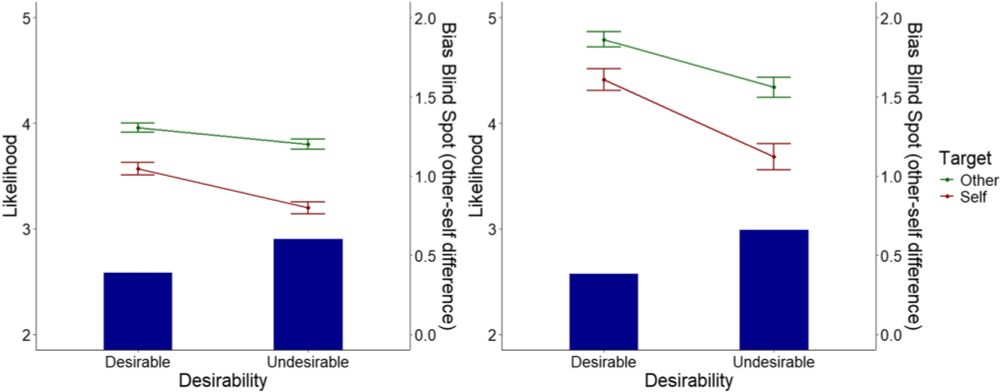
"Motivated Bias Blind Spot: People confess to more or less bias depending on its desirability"
link.springer.com/article/10.1...
1/5
🧠 New research out now!
Why do people think some psychological phenomena (like falling in love) are harder to explain scientifically than others (like reading a map)?
Turns out it depends on the type of explanation people think about!
🧠 New research out now!
Why do people think some psychological phenomena (like falling in love) are harder to explain scientifically than others (like reading a map)?
Turns out it depends on the type of explanation people think about!
"The spirit is noble, but the flesh is corrupt: lay beliefs about the bases of (im)moral behavior"
www.researchgate.net/publication/...
1/4

"The spirit is noble, but the flesh is corrupt: lay beliefs about the bases of (im)moral behavior"
www.researchgate.net/publication/...
1/4
To me, interdisciplinarity is key to good research -- and being recognized as doing research that embodies that is a dream come true! 1/3
To me, interdisciplinarity is key to good research -- and being recognized as doing research that embodies that is a dream come true! 1/3
In previous work, we found that people process faces in paintings like natural faces, even for art styles high on distortion (e.g., Cubism) - using behavioral tasks. Does this hold for neuronal activity? 1/4

In previous work, we found that people process faces in paintings like natural faces, even for art styles high on distortion (e.g., Cubism) - using behavioral tasks. Does this hold for neuronal activity? 1/4
"Group membership in the more prestigious hard sciences is related to a stronger tendency to downplay the intellectual contribution of social science disciplines compared to other hard science disciplines."
#MetaSci #PhilSci #AcademicSky 🧪

"Group membership in the more prestigious hard sciences is related to a stronger tendency to downplay the intellectual contribution of social science disciplines compared to other hard science disciplines."
#MetaSci #PhilSci #AcademicSky 🧪
This time in a different capacity - that of a forecaster! It was an interesting experience to try and harness intuitions and pieces of evidence I was aware of when trying to predict the evolution of discrimination
Interesting - and surprising imo - results below
(1) "bias in favor of male over female[s] was eliminated and, if anything, slightly reversed ...starting in 2009 for mixed-gender and male-[typed] jobs in our sample [of] 244 effect sizes from 85...audits and 361,645 ...job applications".
...

This time in a different capacity - that of a forecaster! It was an interesting experience to try and harness intuitions and pieces of evidence I was aware of when trying to predict the evolution of discrimination
Interesting - and surprising imo - results below
Our new published paper with so many wonderful researchers:
www.nature.com/articles/s41...
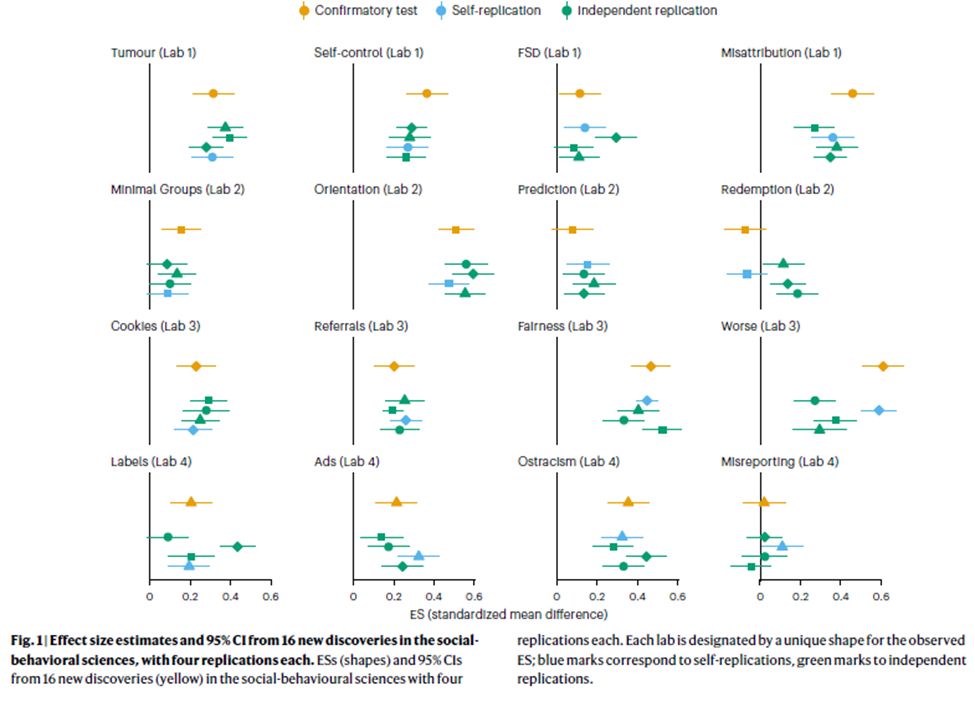
Our new published paper with so many wonderful researchers:
www.nature.com/articles/s41...
It's fascinating to see psychology and philosophy converge to inform one another
If any of you want to discuss this topic further, just reach out to me!
I'd be glad to share data and/or materials, a copy of the paper, etc.
@cruzf.bsky.social and André Mata have an exciting new series of studies showing that people tend to have *conflicting intuitions*. They are drawn to dualism but also drawn to physicalism
I argue that recent results suggest a new picture:
- It’s mostly NOT about different people having different intuitions
- It’s about individual people having CONFLICTING INTUITIONS
philpapers.org/archive/JOSC...
It's fascinating to see psychology and philosophy converge to inform one another
If any of you want to discuss this topic further, just reach out to me!
I'd be glad to share data and/or materials, a copy of the paper, etc.
👉 Opens the door to research focused on when people go for one intuition or its opposite
Also, aligns with my own (TBPublished) research: People are intuitive dualists, but attribute more material basis for psych phenomena when recruiting their more deliberate beliefs!
I argue that recent results suggest a new picture:
- It’s mostly NOT about different people having different intuitions
- It’s about individual people having CONFLICTING INTUITIONS
philpapers.org/archive/JOSC...

👉 Opens the door to research focused on when people go for one intuition or its opposite
Also, aligns with my own (TBPublished) research: People are intuitive dualists, but attribute more material basis for psych phenomena when recruiting their more deliberate beliefs!
Onboarding: Complete ✅️
Looking forward tk the months to come, as a Visiting Student at Princeton University

Onboarding: Complete ✅️
Looking forward tk the months to come, as a Visiting Student at Princeton University


